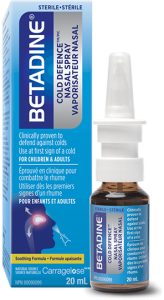Numerous studies have confirmed that povidone-iodine inactivates many common viruses, including SARS-CoV-1, MERS-CoV, Ebola, HIV, adenovirus, polyomavirus, hepatitis A and SARS-CoV-2. Topical nasal sprays with povidone-iodine (PVP-I), better known as Betadine™ (Active Ingredient: 0.45% Povidone Iodine ), may be an effective method to immediately reduce the viral load of the upper aerodigestive tract and thus decrease the risk of inadvertent virus transmission.
“PVP-I functions as an antiseptic through several mechanisms and is considered to have the broadest spectrum of action compared to other common antiseptics such as chlorhexidine. The two most potent antiseptic metabolites of PVP-I are molecular I2 and hypoiodous acid, which deliver free iodine. These free iodine molecules oxidize amino acids, nucleic acids and cell membranes. Through oxidation of cell surface receptors, PVP-I prevents the attachment of viruses to cellular receptors “
“In 2015, Eggers et al. reported that a 1% PVP-I gargle for 15 s reduced Middle East respiratory syndrome-related coronavirus (MERS-CoV) titer by greater than 99.99% [13]. In 2018, Eggers again demonstrated that both Severe Acute Respiratory Syndrome Coronavirus 1 (SARS-CoV-1) and MERS-CoV could be rapidly inactivated by PVP-I in concentrations as low as .23% applied for 15 s.. Other authors have reported similar viricidal effects on influenza, rotavirus, Ebola, HIV, adenovirus, polyomavirus, and hepatitis A. Of note, PVP-I also has bactericidal effects against common oral pathogens such as Klebsiella pneumonia and Streptococcus pneumonia”
“PVP-I has been used for more than 60 years as a topical antiseptic agent. Of note, PVP-I is viricidal against a wide range of viruses, including coronaviruses. Numerous reports confirm that low doses of PVP-I applied for short periods of time are extremely effective at reducing viral load. The safety profile of topical application of PVP-I to oral mucosa has been demonstrated.” Journal of Otolaryngology
“In this controlled in vitro laboratory research study, test media infected with SARS-CoV-2 demonstrated complete inactivation of SARS-CoV-2 by concentrations of PVP-I nasal antiseptic as low as 0.5% after 15 seconds of contact, as measured by a log reduction value of greater than 3 log10 of the 50% cell culture infectious dose of the virus.”” 2020 research
Efficacy of Povidone-Iodine Nasal and Oral Antiseptic Preparations Against Severe Acute Respiratory Syndrome-Coronavirus 2 (SARS-CoV-2)
All concentrations of nasal antiseptics and oral rinse antiseptics evaluated completely inactivated the SARS-CoV-2.
Conclusions: Nasal and oral PVP-I antiseptic solutions are effective at inactivating the SARS-CoV-2 at a variety of concentrations after 60-second exposure times.
Betadine also effective at killing cancer cells.
“our data suggest that PVP-I exhibits a strong inhibitory effect on tumor growth in colon cancer (CT26) and hepatoma (H22) resulting from apoptosis, both in vitro and in vivo, suggesting a new potential therapeutic approach after tumor excision surgery to colon cancer and hepatoma.
Researchers in Italy researched using Betadine active ingredient as an alternative to chemotherapy. Tested Betadine on four different mesothelioma cell lines with varying strengths of the PVP-I solutions. Incubation periods with the cells ranged from five minutes to 24 hours. The researchers found a wide range of cell death, depending upon the strength of the solution used and the time period being tested.
“Povidone-iodine (PVP-I) or Betadine, a combination of molecular iodine and polyvinylpyrrolidone, has replaced the solution (tincture) of iodine widely used in clinical practice [4]. PVP-I has been used in hand disinfection, skin preparations and antiseptic irrigation for many years owing to the effective and wide antimicrobial activity [5]. In the last years, several studies have also addressed its use as a sclerosing agent to promote pleurodesis in recurrent malignant pleural effusion or to prevent tumour seeding at the time of abdominal or thoracic surgery [6–8]. Yet, its antitumour effects on breast cancer and MPM cells have also been demonstrated in vitro” Antineoplastic activity of povidone-iodine on different mesothelioma cell lines: results of in vitro study

